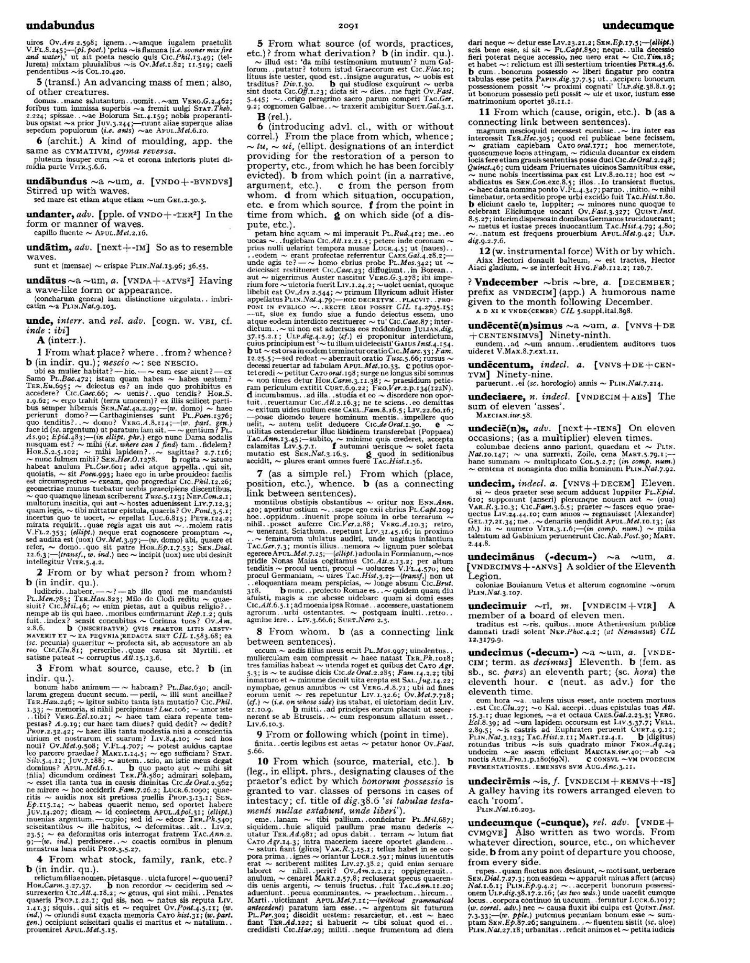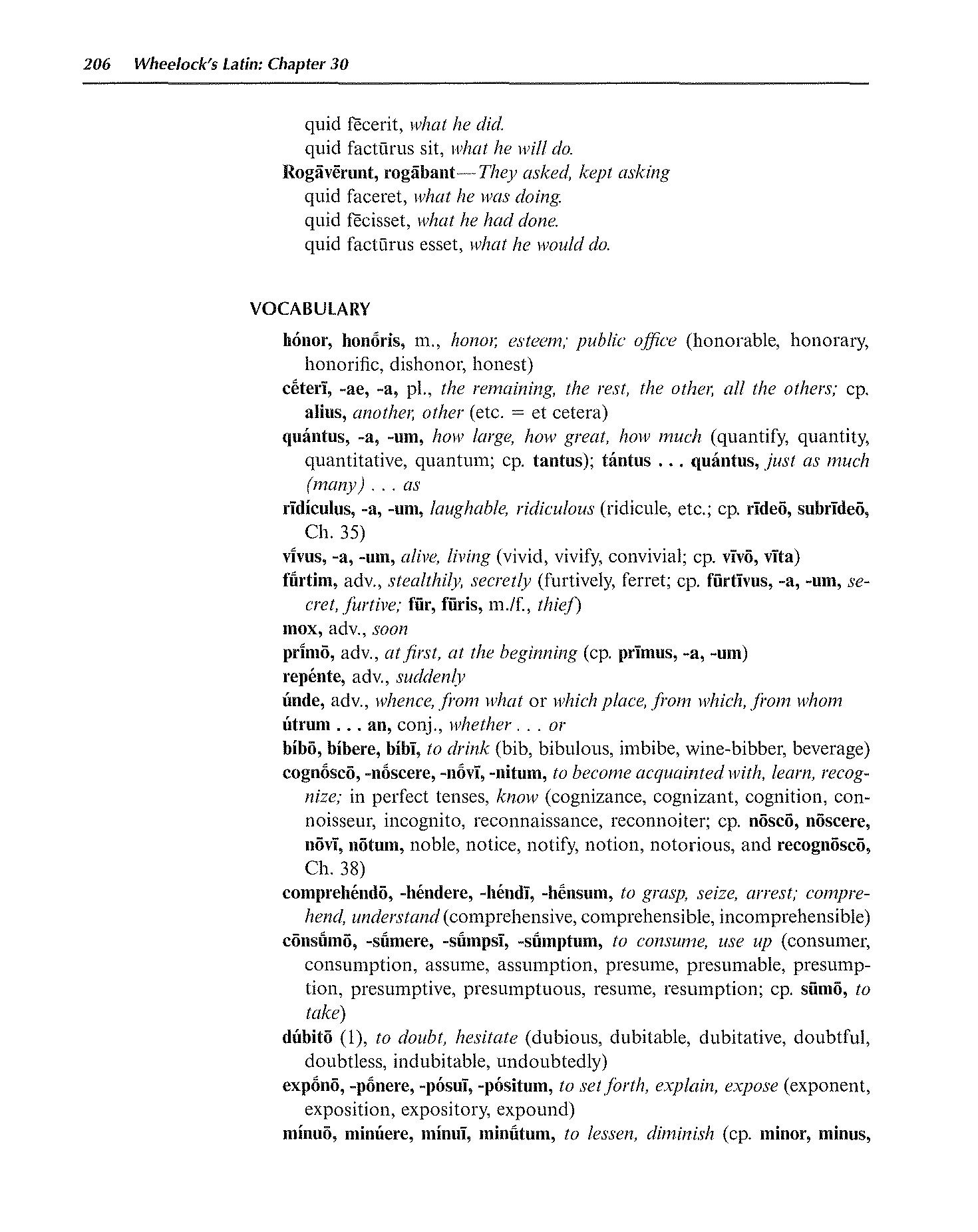
page_listing.tpl
page_subListingDetails.tpl
sub_listingDetails_style1.tpl
sub_listingDetails.title.tpl
unde from where
unde is a Latin Adverb that primarily means from where.
Definitions for unde
Wheelock's Latin
Adverb
- 1
whence, from what or which place, from which, from whom
Oxford Latin Dictionary
Adverb
- 1
(interr.). From what place? where..from? whence? (b) (in indir. qu.); nescio ~: see NESCIO.
- 2
From or by what person? from whom? (b) (in indir. qu.).
Sentences with unde
Latin to English
Pīrātae rogābant unde vēnissēmus.Compare The pirates were asking from where we had come.
Unde vēnistis?Compare From where have you come?
Iuvat integros accedere fontis atque haurire, iuvatque novos decerpere flores insignemque meo capiti petere inde coronam unde prius nulli velarint tempora musae; primum quod magnis doceo de rebus et artis religionum animum nodis exsolvere pergo, deinde quod obscura de re tam lucida pango carmina, musaeo contingens cuncta lepore.Compare I love to approach virgin springs and there to drink: I love to pluck fresh flowers, and to seek an illustrious chaplet for my head from fields whence ere this the Muses have crowned the brows of none; first because my teaching is of high matters, and I proceed to unloose the mind from the close knots of religion; next because the subject is so dark and the lines I write so clear, as I touch all with the Muses's grace.
Satis sum sumque, unde decus bellum pario.Compare There has been and there will be opportunity enough, from which military glory will be acquired.
Itaque ego mirus videor, unde hic tu imago, qui habeo, invenio.Compare And so it seems wonderful to me, whence you found this state which you possess.
Data sources
Notes
- Definitions
- Frederick M. Wheelock, Wheelock's Latin, 6th ed., rev. Richard A. LaFleur (New York, NY: HarperCollins Publishers, 2005): 206.
- P. G. W. Glare, Oxford Latin Dictionary, Vols. 1-8 (Oxford: Clarendon Press, 1982): 2091.
- Word frequencies
- Christopher Francese, "Latin Core Vocabulary," Dickinson College Commentaries, last modified 2014, http://dcc.dickinson.edu.
- Paul B. Diederich, The Frequency of Latin Words and Their Endings, PhD diss., (Columbia University, 1939).
- Louis Delatte, Suzanne Govaerts, Joseph Denooz, and Etienne Evrard, Dictionnaire fréquentiel et index inverse de la langue latine [Frequency Dictionary and Inverse Index of the Latin Language] (Liège, Belgium: Laboratoire d'analyse statistique des langues anciennes de l'Université de Liège [L.A.S.L.A.], 1981): 125.
Bibliography
Allen, Joseph H. Allen and Greenough's New Latin Grammar for Schools and Colleges: Founded on Comparative Grammar. Edited by James B. Greenough, George L. Kittredge, Albert A. Howard, and Benjamin L. D'Ooge. Boston, MA: Ginn & Company, 1903.
Crystal, David. A Dictionary of Linguistics and Phonetics. 6th ed. Oxford, UK: Blackwell Publishing, 2008.
Delatte, Louis, Suzanne Govaerts, Joseph Denooz, and Etienne Evrard. Dictionnaire fréquentiel et index inverse de la langue latine [Frequency Dictionary and Inverse Index of the Latin Language]. Liège, Belgium: Laboratoire d'analyse statistique des langues anciennes de l'Université de Liège (L.A.S.L.A.), 1981.
Diederich, Paul B. The Frequency of Latin Words and Their Endings. PhD diss., Columbia University, 1939.
Francese, Christopher. "Latin Core Vocabulary." Dickinson College Commentaries. Last modified 2014. http://dcc.dickinson.edu/latin-vocabulary-list.
Gildersleeve, Basil L., and Gonzales Lodge. Gildersleeve's Latin Grammar: Third Edition, Revised, and Enlarged. 3rd ed. London, England: Macmillan and Co., 1903.
Glare, Peter G.W. Oxford Latin Dictionary. Vols. 1-8. Oxford, England: Clarendon Press, 1982.
Krüger, Bernd. "Latin Conjugation Tables." Cactus2000. Accessed May 5, 2023. https://latin.cactus2000.de/index.en.php.
Pierson, Nick. "Sound of Text." Accessed October 26, 2019. https://soundoftext.com.
Wheelock, Frederick M. Wheelock's Latin. 6th ed. Revised by Richard A. LaFleur. New York, NY: HarperCollins Publishers, 2005.
Wiktionary Contributors. "Victionarium." Wikimedia Foundation, Inc. Updated March 18, 2019. https://la.wiktionary.org/wiki/Victionarium:Pagina_prima.
Citation
Chicago (17th ed.)
Allo Contributors. "unde (adv.) - Latin Word Definition." Allo Latin Dictionary. Last modified . Accessed February 19, 2026. http://ancientlanguages.org/latin/dictionary/unde.
Entry created on . Last updated on .







